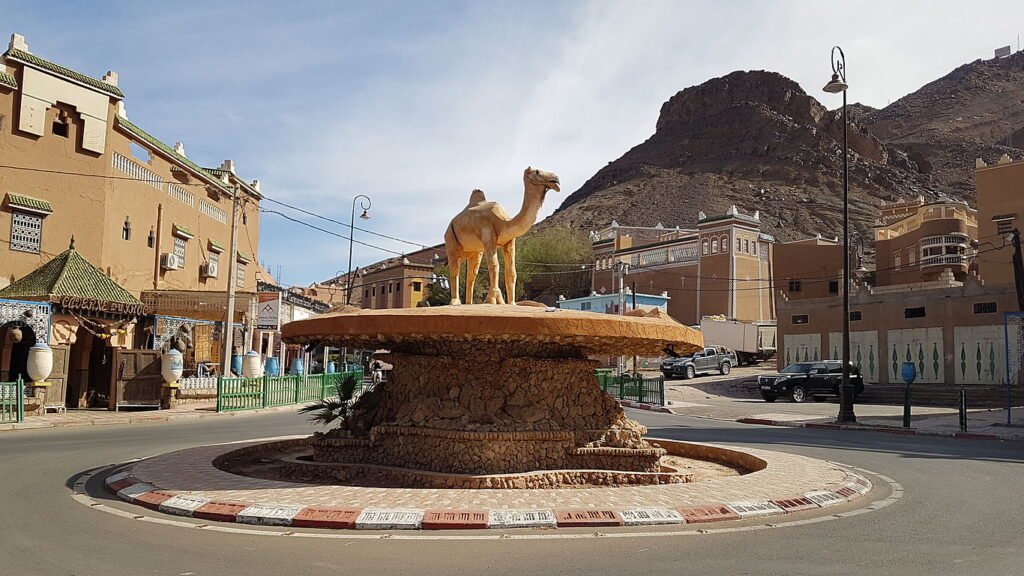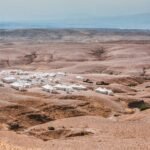Table of Contents
Introduction:
The sun bleeds across the ochre horizon, painting the sky in hues of burnt orange and dusty rose. A gentle breeze, carrying the scent of sand and spice, whispers through the palm fronds, a welcome respite from the desert heat.
This is Zagora, a city nestled in the heart of Morocco’s Draa Valley, a gateway to the vast and mesmerizing Sahara. More than just a jumping-off point for desert adventures, Zagora is a place where ancient history intertwines with a growing commitment to ecological tourism—a place where travelers can connect with the soul of the desert while leaving only footprints behind. Join us as we explore this captivating city, a place where sustainability isn’t just a buzzword but a way of life.
A Tapestry of Time and Terrain

Zagora’s story is etched into its very landscape. Imagine caravans, laden with treasures from distant lands, traversing the ancient trade routes that once pulsed through this valley. Picture the imposing Almoravid fortress, built in the 11th century, standing sentinel against the shifting sands, a testament to Zagora’s strategic importance. The very air here seems to hum with the echoes of history.
Located south of the Atlas Mountains, Zagora enjoys a unique climate. Days are bathed in sunshine; the dry desert air is crisp and invigorating. Nights, however, are a different story. As the sun dips below the horizon, the temperature plummets, and the desert sky explodes with a million stars, a breathtaking spectacle that connects us to the vastness of the universe. This dramatic contrast between day and night is a reminder of the delicate balance of life in this arid environment, a balance we must strive to protect.
Embracing the Oasis Ethos

Ecological tourism in Zagora is more than just visiting a beautiful place; it’s about understanding the interconnectedness of life in the desert. It’s about recognizing the fragility of the ecosystem and actively contributing to its preservation. Imagine trekking through the Tinfou dunes, the sand soft beneath your feet, the silence broken only by the whisper of the wind.
As you traverse this landscape, you’ll learn about the unique flora and fauna that have adapted to this harsh environment. Perhaps you’ll spot a desert fox, its fennec ears alert, or a hardy desert plant clinging to life in the arid soil. Or consider exploring the palmeraie, a lush green ribbon of life snaking through the valley, fed by the precious water of the Draa River. These oases are not just beautiful; they are vital to the survival of both humans and animals. Ecological tourism encourages responsible water usage, supports local initiatives to protect these vital resources, and promotes practices that minimize our impact on the environment.
Walking Hand-in-Hand with the Community

The true heart of Zagora lies in its people. The Berber communities that call this region home have a deep connection to the land, their traditions and customs woven into the fabric of daily life. Imagine the aroma of freshly baked bread wafting from a traditional bakery, the vibrant colors of handcrafted carpets displayed in a local souk, and the rhythmic beat of drums accompanying a traditional dance. Ecological tourism invites us to engage with these communities, learn from their wisdom, and support their livelihoods.
By purchasing locally made crafts, dining in family-run restaurants, and staying in eco-lodges managed by local people, we contribute directly to the economic well-being of the community. This direct interaction fosters cultural exchange, breaks down stereotypes, and creates a deeper understanding and respect for the local way of life. It’s a two-way street where visitors gain authentic experiences and local communities benefit from sustainable tourism practices.
Morocco’s Commitment to Sustainable Zagora

Morocco is increasingly recognizing the importance of sustainable tourism and has taken steps to promote eco-friendly practices in Zagora and other regions. Imagine solar panels glinting in the desert sun, powering eco-lodges and reducing reliance on fossil fuels. Picture local guides trained in sustainable tourism practices, educating visitors about the environment and cultural heritage.
The Moroccan government, along with various NGOs and international organizations, is working to develop infrastructure that minimizes environmental impact, promotes responsible waste management, and supports the development of eco-friendly accommodations.These efforts, combined with the growing awareness among travelers of the importance of sustainable choices, are helping to transform Zagora into a leading example of ecotourism in the Sahara.
As you explore the ancient sites and monuments, engage with the local communities, and immerse yourself in the natural beauty of Zagora, you become part of this movement, a traveler who leaves a positive impact, contributing to the preservation of this unique and precious corner of the world. Zagora awaits, not just as a destination but as an invitation to travel more consciously, more responsibly, and more sustainably.
Conclusion:
As the sun sets over the Draa Valley, painting the sky in fiery hues, a sense of tranquility settles over Zagora. The desert whispers its secrets, the stars begin to gleam, and a profound magic fills the air. But Zagora offers more than just breathtaking landscapes; it offers a chance to connect with the heart of the Sahara sustainably. Walk hand-in-hand with local communities, learn from their ancient wisdom, and support their cultural heritage. Witness the delicate balance of desert life and understand the vital need to protect it.
Experience Zagora, not just as a tourist but as a responsible traveler, a guardian of the Oasis ethos. Let the Sahara whisper to you. Discover the magic of Zagora, where sustainability is a way of life, a promise etched in the sands of time. Your conscious journey awaits.



